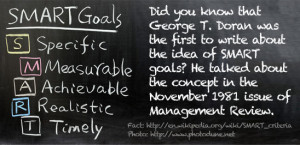By LISA SWAN
If you want to achieve goals large or small, it’s time for you to get smart or even smarter. The key to goal-setting can be found in the acronyms SMART and SMARTER.
Having nebulous goals will get you nowhere. It’s not enough to sit on your couch and say that you want to lose weight or get a new job. You need to have a plan.
That’s where SMART goals come in. They give a structure to your goals that can make them easier to accomplish. Here’s how SMART goals work. SMART is an acronym for Specific, Measurable, Attainable, Realistic and Time-Sensitive. Let’s take a look at how a weight-loss goal could be achieved with a SMART goal:
- Specific: How much weight do you want to lose? You need to set a specific goal. You can look at what is the appropriate weight for your height and frame and start there. After doing so, let’s suppose you want to lose 50 pounds. That is your specific coal.
- Measurable: How can you measure your progress? Weight loss is an easy goal to measure. Simply hop on the scale. However, other goals are not as easily measurable. The idea behind SMART goals is to come up with a goal in which you can measure how you are doing.
- Attainable: Coming back to our weight loss goal again –losing 50 pounds over a year or even over six months is attainable. Losing 50 pounds over a month is not attainable, and even attempting to do so would be unhealthy.
- Realistic: Stick to a goal that is realistic; otherwise, you will get too easily discouraged. With the weight loss goal, if you are middle-aged, it is harder to lose weight, and the chances that you will be ever be as thin as you were in high school are unrealistic. Figuring out a goal that is more realistic will keep you on point.
- Time-Sensitive: It means not just putting a timeframe on your goal, but setting mini-milestones in between. For our weight loss goal, you could break down how much way you need to lose each week, and look to see your progress. This way, you are focused each week on the timelines of your goal.
In order to achieve SMARTER goals, don’t forget to Evaluate and Reevaluate. If you do that during regular intervals, you can change the goals to make them more or less challenging, depending upon what is going on.
Career and life coach experts say that you can use these goals no matter what you are trying to achieve. Just figure out a way to frame your goals in a SMART or SMARTER way.

